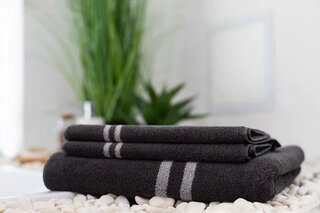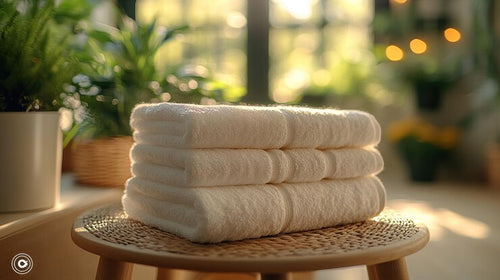When it comes to everyday essentials, few items are as important as towels. From drying off after a shower to cleaning up spills in the kitchen, towels serve many purposes in our daily lives.
Given their frequent use and importance, it's only natural to want to invest in towels that offer the best value for our hard-earned money. When you go to the store, you will have many options in terms of the material and use case. But with so many brands available on the market, how can you be sure you're getting the right one for yourself?
The good thing is that many brands, like Mizu Towel, offer a wide range of towels in different materials and use cases. They also offer online delivery, so you don’t have to visit stores frequently.
In this article, we'll delve into different types of towels and factors that determine their value to help you make an informed decision. So, let’s dive in.
Comparing the Best Towels: What Options Do You Have?
Before delving into the specifics of towel value, it's crucial to understand the breadth of options available in the market. Towels come in various types, each catering to different needs and preferences.
We have divided the towel types into use cases and materials.
Different Materials
Here's a list of towels categorized based on their material:
-
Cotton Towels
Cotton towels are the most common type of towel and are widely favored for their softness, absorbency, and durability. They are available in various grades, including standard cotton, Egyptian cotton, and Turkish cotton. Cotton towels are breathable and hypoallergenic, making them suitable for sensitive skin.
-
Microfiber Towels
Microfiber bath towels are made from synthetic materials like polyester and nylon, woven into fine, thinner fibers than human hair. The best microfiber towels are highly absorbent, quick-drying, lint-free, and non-abrasive, making them suitable for delicate surfaces like glass and electronics.
-
Bamboo Towels
Bamboo towels are crafted from bamboo fibers, which are naturally antimicrobial and hypoallergenic. They are known for their exceptional softness, luxurious texture, highly absorbent, and moisture-wicking, making them eco-friendly alternatives to traditional cotton towels.
For instance, Mizu Towels are made of authentic bamboo luxurious cotton infused with silver fibers. These qualities make them one of the best antibacterial towels out there.
-
Linen Towels
Linen towels are made from flax fibers, known for their strength and durability. They have a slightly rough texture compared to cotton towels but become softer and more absorbent with each wash. Linen towels are highly absorbent and quick-drying, making them ideal for use in the kitchen and bathroom.
-
Hemp Towels
Hemp towels are crafted from hemp fibers, known for their strength and sustainability. They are naturally antibacterial and resistant to mold and mildew. Moreover, they are highly durable and become softer and more absorbent over time, making them a long-lasting and eco-friendly choice.
-
Organic Cotton Towels
Organic cotton towels are made from cotton that is grown without the use of synthetic pesticides or fertilizers. They are free from harmful chemicals and additives, making them a safe choice for those with sensitive skin. Additionally, organic cotton towels are also soft, absorbent, and durable.
By selecting towels tailored to their specific use cases, you can ensure you have the right tools for your daily hygiene and lifestyle needs.
Different Use Cases
Here's a list of towels categorized based on their typical use case:
-
Bath Towels
Bath towels are the most common type of towel used for drying off after bathing or showering. They are typically larger to wrap around the body comfortably. The best bathroom towel sets should be soft, absorbent, and durable for optimal comfort and functionality.
-
Hand Towels
Hand towels are smaller in size and are used for drying hands after washing. They are often placed near sinks in bathrooms and kitchens for convenience. Hand towels should be absorbent and quick-drying to dry hands between uses effectively.
-
Washcloths
Washcloths, or face towels, are small square towels used to clean the face and body. They are typically made from soft and gentle materials to avoid skin irritation. Washcloths are commonly used with facial cleansers or body wash to remove dirt, oil, and makeup.
-
Hair Towels
Hair towels are explicitly designed for drying hair after washing. They are often made from highly absorbent materials like microfiber to speed up drying. Hair towels are lightweight and gentle on hair to prevent damage and frizz.
-
Beach Towels
Beach towels are larger and more durable than standard towels, making them ideal for outdoor activities. The best beach towels are designed to withstand sand, sun, and water exposure, making them perfect for beach trips and poolside lounging.
The best personalized beach towels often feature vibrant colors, patterns, and designs to reflect the fun and relaxed atmosphere of beach environments.
-
Spa Towels
Spa towels are luxurious towels commonly found in spas and hotels. They are made from premium materials like Egyptian or Turkish cotton for superior softness and absorbency. Spa towels are larger than standard bath towels and are often used for wrapping around the body during spa treatments or relaxation sessions.
-
Gym Towels
Gym towels are compact and lightweight towels designed for use during workouts and exercise routines. They are highly absorbent and quick-drying to keep sweat at bay and maintain hygiene during physical activity.
Gym towels are typically smaller than the best bathroom towel sets, making them convenient for carrying to and from the gym.
Selecting towels tailored to your specific use cases ensures you have the right tools for your daily hygiene and lifestyle needs.
Quality vs. Price
When selecting the perfect towel, the choice of material plays a significant role in determining both quality and price. Each type of material offers unique characteristics in terms of softness, absorbency, durability, and eco-friendliness.
-
Cotton Towels
Cotton towels are renowned for their softness, absorbency, and durability. The price of cotton towels can vary widely depending on factors such as the type of cotton used, the thread count, and the construction.
Egyptian and Turkish cotton towels are more expensive due to their premium quality, while standard cotton towels are more budget-friendly. Cotton towels typically start from $15 and go as high as hundreds of dollars.
-
Microfiber Towels
Microfiber towels are known to trap dirt and debris effectively, making them ideal for cleaning. The best microfiber towels are typically more affordable than cotton towels, making them a budget-friendly option for those seeking high performance at a lower cost.
While they may not offer the same luxurious feel as cotton towels, microfiber towels excel in terms of practicality and durability. You can get them for as low as $10 and as high as hundreds of dollars.
-
Bamboo Towels
Bamboo fibers are naturally hypoallergenic and eco-friendly, making them ideal for individuals with sensitive skin or those seeking sustainable alternatives. They are often priced slightly higher than standard cotton towels due to the eco-friendly nature of bamboo cultivation and processing.
However, the luxurious feel and benefits of bamboo fibers make them a worthwhile investment for those prioritizing comfort and sustainability. Their price starts from $39 and reaches hundreds of dollars.
-
Linen Towels
Linen towels have a distinct texture that becomes softer and more supple with each wash, making them a favorite among those who appreciate the rustic charm and natural elegance. The best beach towels made of linen are considered a luxury option and are priced accordingly.
While they may be more expensive than cotton towels, the exceptional quality and longevity of linen towels justify the higher cost for many consumers. Their cost starts from $15 and goes as high as hundreds of dollars as you move up to the luxurious brands.
-
Hemp Towels
Hemp towels are prized for their strength, durability, and antimicrobial properties. They are often priced competitively with cotton towels, offering comparable quality and performance at a similar cost. You can get them for as low as $15.
While they may not be as widely available as cotton towels, hemp towels are gaining popularity for their eco-friendly credentials and exceptional durability.
-
Organic Cotton Towels
Organic cotton towels are made from cotton grown without synthetic pesticides, fertilizers, or genetically modified organisms (GMOs). They are typically priced slightly higher than conventional cotton towels due to the additional costs associated with organic certification and sustainable farming practices.
However, many consumers are willing to pay a premium for the peace of mind and environmental benefits that organic cotton towels provide.
Longevity and Durability
When investing in towels, longevity and durability are essential to ensure that your purchase withstands the test of time. Different materials offer varying levels of resilience and longevity.
Let's explore how various towel materials compare their longevity and durability.
-
Cotton Towels
Cotton towels are known for their durability and longevity, especially when made from high-quality cotton such as Egyptian or Turkish cotton. The long-staple fibers in these varieties are less prone to breakage and pilling, ensuring the towels maintain their integrity through repeated use and washing.
With proper care, cotton towels can last many years without losing their softness or absorbency. However, factors such as thread count, weave, and fabric weight can also influence the durability of cotton towels, with denser and heavier towels typically being more resilient.
-
Microfiber Towels
The best microfiber towels consist of densely packed synthetic fibers less susceptible to fraying and degradation. This makes them a long-lasting option for various cleaning and drying tasks.
Microfiber towels can withstand frequent use and washing without losing their effectiveness or softness. However, it's essential to avoid exposing microfiber towels to high heat, as excessive heat can damage the synthetic fibers and reduce their longevity.
-
Bamboo Towels
Bamboo towels are naturally strong and resilient, making them less prone to breakage or weakening over time. These towels also retain their softness and absorbency even after multiple washes.
Bamboo towels can withstand regular use and washing without losing integrity or performance. The inherent antimicrobial properties of bamboo fibers also contribute to the longevity of these towels by reducing the risk of mold, mildew, and odor buildup.
-
Linen Towels
Linen towels are inherently strong and durable, becoming softer and more supple with each wash. Unlike cotton towels, linen towels tend to get better with time, making them an excellent investment for long-term use.
Linen towels can withstand frequent washing and drying without losing shape or texture. The natural resilience of linen fibers makes them resistant to stretching, tearing, and pilling, ensuring that linen towels maintain their quality and appearance for years to come.
-
Hemp Towels
Hemp towels are made of the strongest natural fibers, making them highly resistant to wear, tear, and abrasion. With proper care, these towels can last many years without showing deterioration.
Thanks to their robust construction and natural resistance to damage, hemp towels are well-suited for frequent use and washing. Additionally, hemp fibers become softer and more absorbent with each wash, enhancing the durability and performance of hemp towels over time.
-
Organic Cotton Towels
Organic cotton towels offer longevity and durability similar to conventional cotton towels, with the added benefit of eco-friendly production practices. By eliminating synthetic pesticides and fertilizers, organic cotton towels may have a lower environmental impact and promote sustainable agriculture.
With proper care, organic cotton towels can last for many years, maintaining their softness and absorbency throughout their lifespan. While they may be slightly more expensive than conventional cotton towels, their durability and environmental benefits justify the investment for many consumers.
Absorbency and Softness
When it comes to towels, absorbency and softness are paramount for ensuring optimal comfort and functionality. Different materials offer varying levels of absorbency and softness, influenced by factors such as fiber structure, weaving techniques, and surface texture.
Let's explore how various towel materials compare in terms of their absorbency and softness.
-
Cotton Towels
The absorbent nature of cotton allows it to quickly wick away moisture from the skin, making cotton towels ideal for drying off after bathing or showering.
Whether you get the best beach towels or bathroom sets, cotton towels offer a soft and plush texture for a luxurious feel against the skin. The softness of cotton towels is enhanced by factors such as the cotton quality, the thread count, and the weaving technique employed.
-
Microfiber Towels
The best microfiber towels are absorbant due to the densely packed synthetic fibers that make up their structure. The fine fibers in microfiber towels have a high surface area, allowing them to quickly and effectively absorb moisture.
These towels also have a soft and velvety texture, providing a gentle touch against the skin. The smooth surface of microfiber towels glides effortlessly over the skin, making them a comfortable option for drying off after bathing or showering.
-
Bamboo Towels
Bamboo towels offer excellent absorbency, thanks to the natural properties of bamboo fibers. Bamboo fibers have a unique structure that enables them to absorb moisture quickly and efficiently. In fact, the Mizu towel quickly absorbs up to 5x its weight in water.
Bamboo towels also offer a silky-smooth texture for a gentle and comforting touch against the skin. This makes them a popular choice for those seeking ultimate comfort and relaxation.
-
Linen Towels
Linen towels offer moderate absorbency, with the ability to quickly wick away moisture from the skin. While not as absorbent as cotton or microfiber towels, linen towels still provide adequate drying capabilities, making them suitable for everyday use.
Linen towels have a unique texture that becomes softer and more supple with each wash. While linen towels may feel slightly coarse initially, they gradually soften over time, offering a comfortable and luxurious feel against the skin.
-
Hemp Towels
Hemp towels have a porous structure that allows them to absorb moisture quickly and efficiently. This makes hemp towels ideal for drying off wet surfaces or soaking up spills.
Hemp towels have a slightly coarse texture compared to cotton or bamboo towels, but they soften with each wash. While not as soft as some other materials, hemp towels still offer a comfortable and functional option for everyday use.
-
Organic Cotton Towels
The best bathroom towel sets made of organic cotton offer similar absorbency to conventional cotton towels. They quickly and effectively wick away moisture from the skin. Moreover, the natural softness of organic cotton fibers makes organic cotton towels a comfortable and indulgent option for drying off after bathing or showering.
You may also read: All the Secrets about Hotel Towels - Soft & Fluffy
Conclusion
Selecting towels offering optimal value demands balancing qualities like absorbency, softness, durability, and cost.
Luxurious cotton towels, such as Egyptian or Turkish, promise unparalleled comfort at a higher price, while microfiber and organic cotton towels offer affordability without compromising performance.
When shopping for the best towels, you should consider a few factors to make the right choice for your needs and preferences. These include longevity, sustainability, drying capabilities, and more. For instance, linen and hemp towels provide durability and eco-friendliness.
Ultimately, your ideal towel hinges on personal needs and budget. By weighing these factors, you can find towels that enrich daily routines with comfort and longevity, ensuring your investment pays off in the long run.


















